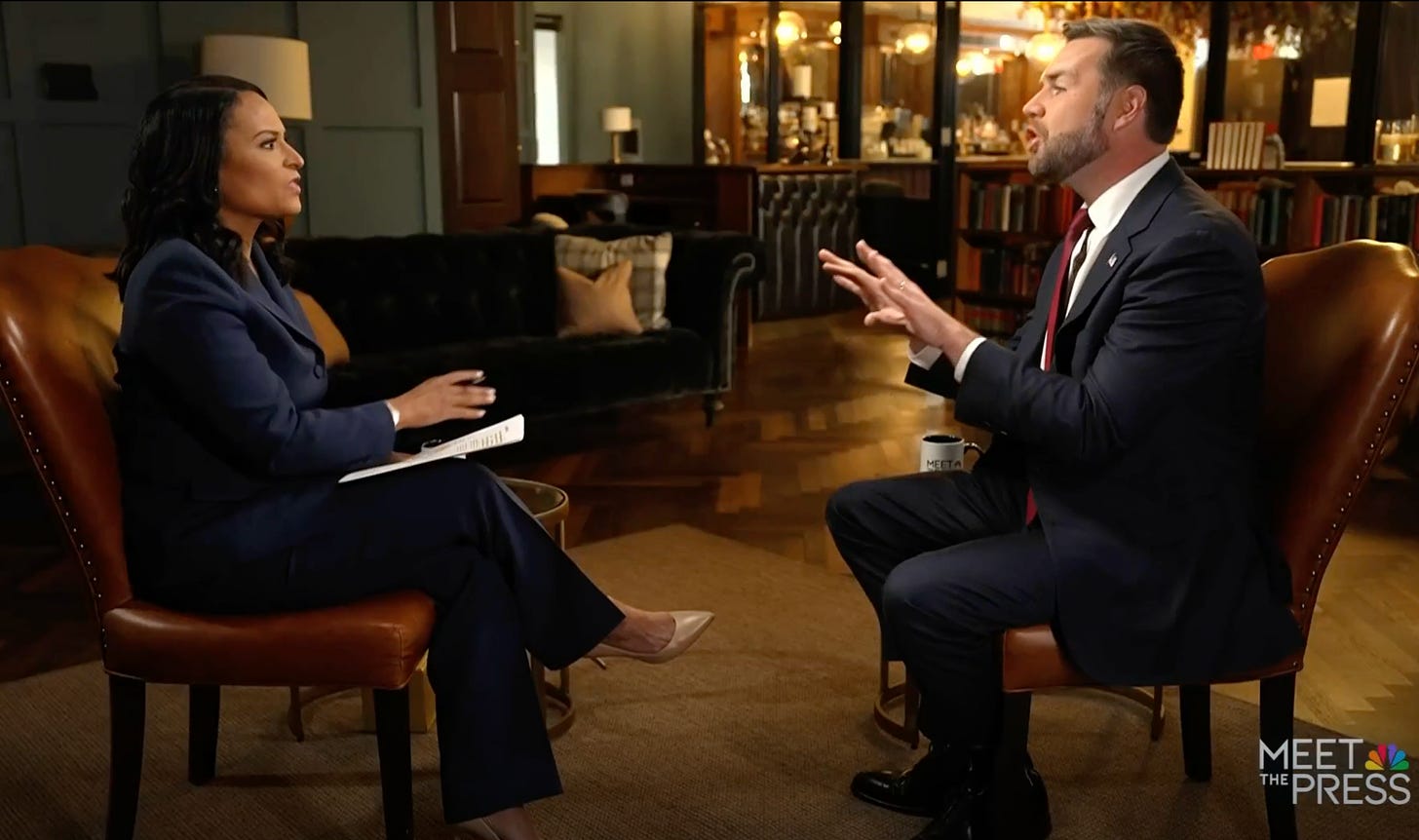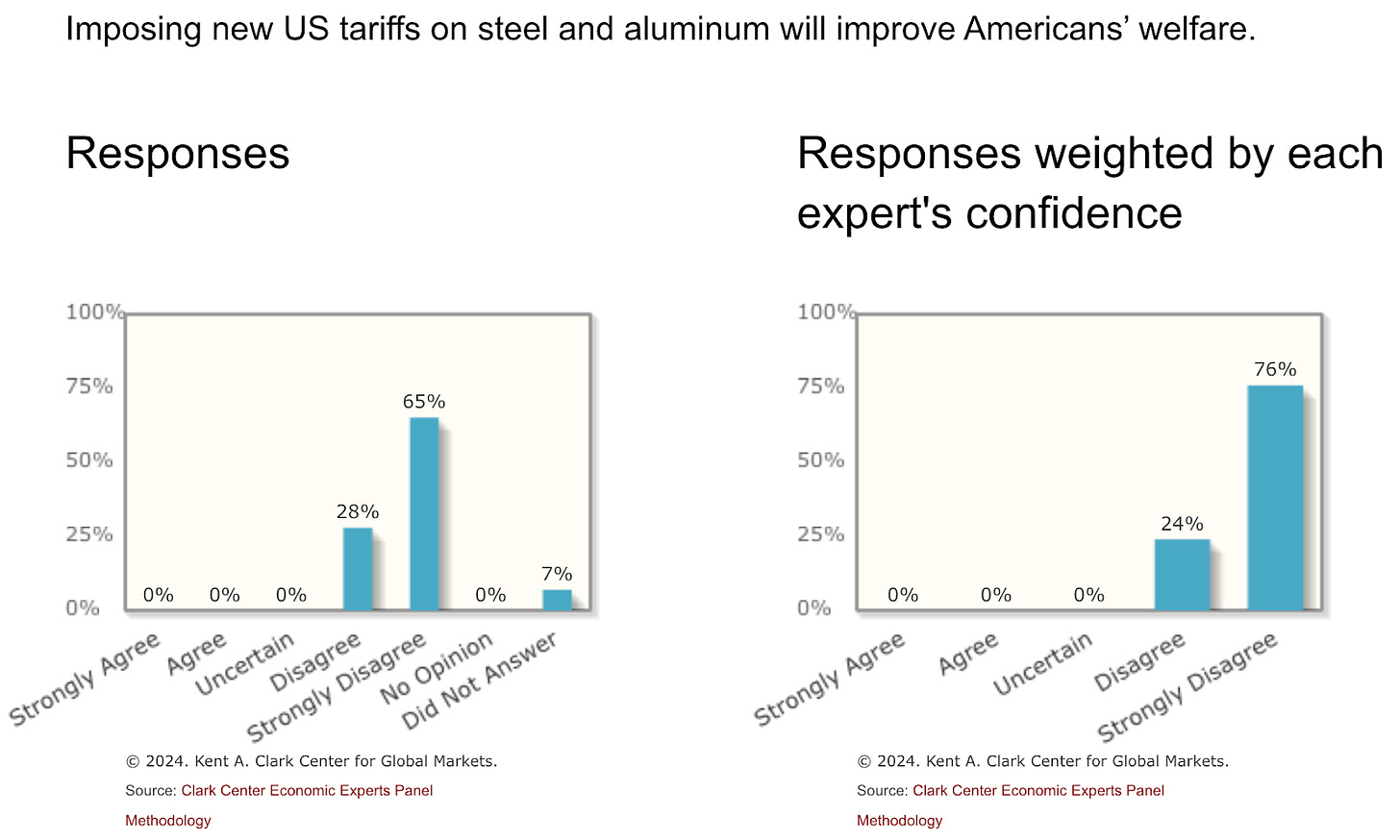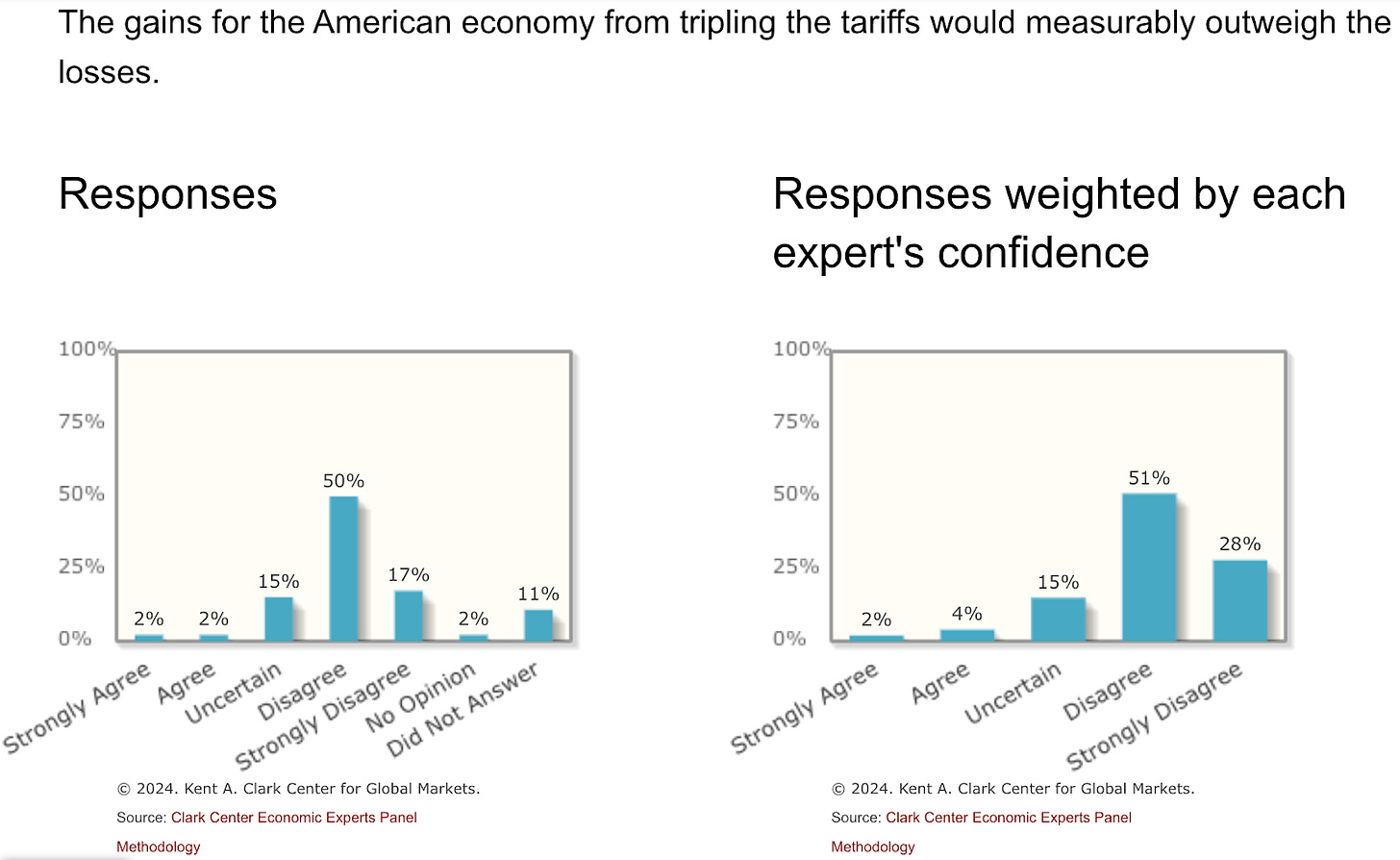Vance Lies About His Lies
Caught in one of multiple lies, Vance told another to get out of it
The Vance Files: This article is one of a series examining the early writings and record of vice presidential candidate Sen. JD Vance (R-OH). You can support TFN’s reporting with a paid subscription or one-time donation.

After almost a decade of the news grappling with the many lies of Donald Trump, the lies of Sen. JD Vance (R-OH) have yet to get a full analysis. They are both more traditional but also in some ways more radical than Trump’s, heralding a new generation of feral, unrestrained dishonesty not like the transparently unhinged MAGA fantasies, but masked by the raiment of faux-intellectual discourse.
Republicans are calling out and successfully drawing pliant media to look at allegations of dishonesty by Gov. Tim Walz (D-MN). At issue are trivial matters such as Walz’s dog and his culinary habits.
Too often, the scent of dishonesty to prove is what draws the media. Meanwhile, blatant lies told about profound issues with material consequences for the nation may get challenged in the moment, but Vance has been successful in thwarting those challenges simply by doubling down, telling a new lie to bolster the previous one — upping the stakes until the cost of challenging him becomes too high.
Media ignore them afterward because there’s no thrill of the chase. It was presented to them.
Vance has the moral righteousness to lie with conviction and the training to get away with it.
One thing elite institutions teach is creativity. Fudging, in less kind terms. The ability to defend any proposition, regardless of its factuality or morality.
Innovative reasoning is especially nurtured and rewarded. As a result, it’s not surprising that Vance in his memoir recounted multiple instances of his own dishonesty at Yale Law with little sign of shame or sense of wrongdoing. His exegesis of his own myth focused more on external forces; shifting the blame to society as if he were the kind of stereotypical liberal he so disdains.
I’ve written about those lies before. That installment of The Vance Files concerned the lies he told as an adult, and his rationalizations for them.
But this weekend, Vance engaged in a different breed of lying, one more brazen in some ways even than Trump’s. While Trump lies on impulse and then by habit (with the occasional gift of enough hyperbole to serve as a knowing wink), Vance this weekend lied deadpan, in a manner that reflected his academic lineage.
Before I dive into it, a quick parable. In college I took a course in symbolic logic. We had to construct proofs to get from a set of propositions to a conclusion. On one assignment, I couldn’t figure out how to get from A to D. So I fudged.
I showed that A must lead to B and B to C and C to D, ergo A leads to D. But I didn’t really have that second step, so instead of conceding that I couldn’t figure it out, I got B and C as close together as I could and then disguised the gap between them as a tiny mistake rather than evidence I had failed the entire assignment.
That’s what good liars do. They find the smallest pocket that will conceal their dishonesty. Then they deploy their arsenal to thwart scrutiny of it.
In this case, the scrutiny was coming from NBC’s Kristen Welker. She was focusing on Trump’s plan to impose tariffs of at least 10% on all imports. At least 50% on China’s stuff. The most powerful weapon in Vance’s arsenal was Welker’s time limits and the unavoidable reality that no individually can simultaneously conduct an interview and fact-check it in real time. Here’s the exchange:
Welker: Do you acknowledge that consumers ultimately will pay more if there are more tariffs imposed?
Vance: So, economists actually --
Welker: Do you just acknowledge that?
Vance: No, I don't, Kristen. Because I think economists really disagree about the effects of tariffs. Because there can be a dynamic effect, right? So what some economists will say is what you just said, that it will actually raise costs for consumers. But what other people say, and I think the record supports this other view, is that it causes this dynamic effect where more jobs come into the country. Anything that you lose on the tariff from the perspective of the consumer, you gain in higher wages, so you're ultimately much better off.
Vance lied about the effect of tariffs. And to defend himself from Welker’s fact-check, he lied about what economists say about it. And to make that second lie work, he’s making it look like B is close to C.
First of all, it’s absurd to deny that tariffs make consumers pay more. That’s the point of tariffs.
The company importing stuff has to pay the U.S. government the 10% tariff. To make up for that, companies virtually always pass those costs on to consumers, raising the prices of their products, which, again, is the point of tariffs: To make it easier for domestic companies to compete against import prices that might be lower because, for instance, labor is cheaper in the other country.
As Welker notes, it’s well established that Americans paid more due to Trump’s tariffs. In 2018 and 2019, those tariffs cost Americans $79 billion, according to an estimate by the Tax Foundation.
In theory, those higher prices should push consumers to buy from American companies, which then must hire more workers. But it doesn’t always work out that way. Especially if American companies, not just consumers, rely on those imports.
The Tax Foundation concluded that Trump’s tariffs knocked 0.2% off America’s gross domestic product and, contrary to Vance’s claims, actually cost the country 142,000 jobs.
So it’s dishonest for Vance to deny the economic impact of tariffs generally, let alone Trump’s specifically. When Welker pushes back, he doesn’t concede, he doubles down.
“Economists really disagree,” he says. Some economists say tariffs increase consumer costs, he says. Others, he says, argue that tariffs create enough jobs to offset those consumer costs and produce a net benefit for the economy. This is, to be kind, fudging.
Of course economists disagree. Every scholar of any field will have disagreements. But those disagreements are not necessarily dispositive about the central thesis. And that’s true here, as well.
Vance is implying that economists disagree about what he and Welker are discussing. They don’t. They disagree with Vance.
In 2018, the Kent A. Clark Center for Global Markets polled its standing panel of economists about Trump’s tariffs on imported steel and aluminum from China. Out of 40 who responded, not a single one agreed they would improve Americans’ welfare.
The only thing those economists — from some of the field’s top institutions — disagreed about was how strongly they disagree with Vance. Most disagreed strongly.
On Vance’s narrow contention that tariffs will create jobs, it’s true, there is disagreement. This year, the Kent A. Clark Center did a similar survey of its economists panel. A plurality, 33%, said tripling tariffs on Chinese steel and aluminum would create “measurably” higher employment in the industry over five years.
But none agreed strongly, 19% disagreed, and a third were unsure. In other words, the only area where economists genuinely disagree is on job creation, the foundation of Vance’s argument, which he dishonestly claims “the record supports.”
It’s this narrow disagreement — about Vance’s assertion — that Vance cherry-picks, inflating it and blurring it to suggest that this disagreement (at the granular level) is about the core question of overall benefit to the country.
But is there disagreement on that? The Kent A. Clark Center also surveyed economists on the payoffs that Vance said tariffs will produce.
The same economists at odds over Vance’s predicted job growth are virtually unanimous on higher prices resulting. Seventy-four percent agree. Only 2% disagree. That 74% is what Vance characterized as “what some economists will say.” In politics, 75% is a landslide, not some.
But what about Vance’s claim that higher prices will be offset enough by new jobs that the economy benefits overall? Economists agree.
Only a statistically insignificant 4% take Vance’s side. Sixty-seven percent reject his claim that America will see a net benefit. Half disagree strongly.
One thing the economists cite — but which Welker and Vance didn’t get into — is that Chinese imports can be replaced with imports from other countries, erasing any benefit for the U.S. But also, even if U.S. manufacturing does increase as a result, the correlation with jobs isn’t what it used to be. Why?
Automation. We saw this with coal. Productivity soared as head count dived.
Companies do not want to hire people. If they will profit from manufacturing or using domestic steel, they will do so as cheaply as possible. That means hiring as few people as they can.
Welker did as well as anyone could on a topic that Vance could make appear complicated. It would’ve taken time that her format didn’t allow her to unspool the dishonest complexification Vance used to obscure the fundamental dishonesty of his initial claim: That tariffs are a good idea.
Applied narrowly, tariffs have protected some industries. And the Biden administration has kept some in place. But applied broadly, as Trump proposes, we know from both economic forecasts but also America’s history that tariffs are devastating.
And we know that Vance lied when he said economists disagree. They disagree on only one element of the equation — his claims of benefits — not on the net outcome Vance promises.
It’s worth noting that Vance told other blatant lies in that Welker interview. “[W]e had 12,000 factories that were built during Donald Trump's presidency,” he said.
It was a lie so shielded by TV’s time constraints, that Vance could deploy it safely even though it had been exposed years ago, when then-Pres. Donald Trump said it in 2020.
As the Washington Post reported at the time, the 12,000 figure comes from the Bureau of Labor Statistics (BLS), which doesn’t categorize those establishments as “factories” but as “manufacturing.” More than 80% of those 12,000 manufacturers, however, were not factories, but companies that employ fewer than five people.
In other words, the vast majority were not remotely factories, but outlets such as, according to the BLS, “bakeries, candy stores, and custom tailors.”
This is the kind of definitional fudging endemic to politics. Republicans similarly stretched the definition of “small business” in similar fashion during the 2010 debate over extending the tax cuts of former Pres. George W. Bush.
Like other loyalists, Vance is clearly comfortable propagating even long-disproved Trump hyperbole. But defending his own lies with empirical-seeming additional lies separates Vance from Trump and even from previous generations of Republicans, who at least on occasion would cop to getting it wrong.
This isn’t surprising, given the tendency in recent decades to accord respect to any opinion, and given Vance’s academic background. Law school in particular is known as a place that trains students to advance arguments well, even — or especially — when they know they’re wrong. They’re rewarded for it.
The dishonesty of Vance’s childhood and academic career was not eradicated by any ethical rigor at Yale. Or in politics. The intellectual precincts where Vance has journeyed refined and sharpened his dishonesty. Today it’s skillful and it’s subtle.
It’s worked for politicians in the past, and if any voters truly liked and trusted Vance, it might be working for him now.
Jonathan Larsen is a veteran journalist and TV news producer who’s worked at MSNBC, CNN, ABCNews, and TYT. You can support his independent reporting with a paid subscription to his scatological newsletter, or by making a one-time donation.







I am grateful for you to run down all the real facts and see the way the politicians weasel away answers and unsurprisingly, twist them whatever way they want like play dough. But I am disgusted with the 'media' that just sits and lets the crap flow out of their mouths and never slam them. Tell Vance and tRUMP to prove it. Back it up. Show me the money. Why do WE or the media step back and then have to do the fact checking. They are the ones spouting off their mouth holes (your accurate descriptive term), grabbing what's convenient and no one slams them up against the wall and says prove it. Its not OUR job, its theirs, to convince US to believe their garbage. I for one, know every word out of these assholes mouth is to be taken as a LIE until proven otherwise. By them. Put up or shut up should be the tone of every interview, not passing it off due to time constraints or the next topic or talking about Hannibal Lector. They just keep plastering his blabber front and center and he gets more air time on media outlets saying the stupidest crap ever. Why put this crazy idiot on at all? Ridiculous. Small wonder the dolts that only look at the pictures and think in memes are clutching their guns to follow the guy they see on TV all the time. He must be great. Every word he speaks is on the 'news'. Beh.
Thanks for doing the hard research into the economics of tariffs. You are also right to point out that Trump lies with gross exaggerations. Vance covers his lies with the veneer of academic respectability.